The Arena is a game mode where players compete against each other using specially constructed decks to earn substantial rewards. It features strong elements of luck and chance, with players essentially gambling upon their own success to try to earn rewards by winning as many games as possible before their deck is knocked out. Each admission to the arena costs either 150 in-game gold or real money equivalent to $1.99 USD, €1.79 EUR or £1.49 GBP.
Upon entering the arena, the player will be allowed to select one of three randomly selected classes. They can then choose from a series of randomly selected cards to build a new, unique deck. Unlike other play these cards are not limited by the player's current collection, and there is no limit on the number of each card that can be included in a deck (including legendaries). Players then use their decks to do battle until they have suffered 3 losses, or claimed 12 victories, at which point they will be granted a number of rewards depending on their success. Winning at least seven games before being eliminated guarantees that the player will earn their entry fee back in gold. Players do not have to play all their Arena games at once, but can return to continue their run whenever they wish.
Getting started
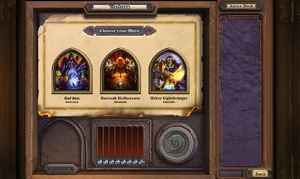
Choosing a class
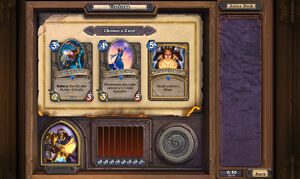
Choosing cards
After selecting a payment method (150 in-game gold or real life currency equivalent to $1.99 USD, €1.79 EUR, £1.49 GBP, R$4.50 BRL, 66 RUB), the player will be presented with three random hero classes to choose from. Once a hero has been selected, they will then be shown thirty different sets of cards, each set featuring three different cards. The player must select one card from each set to be included in their new Arena deck; the two cards not chosen from a set are effectively discarded. Once a card has been chosen, the player cannot undo their selection.
Unlike in constructed play, where each deck can feature a maximum of 2 of each card (and 1 of each legendary), there is no limit in Arena decks to the number of each card that may be featured. Some cards, especially those of lower rarity, may appear several times in different sets. Each selection set features cards of roughly equal value. For example, sets may offer three common cards, or three legendary cards. It should also be noted that only neutral cards and cards for the selected class will be suggested for Arena decks. As the player picks cards, the current decklist is shown on the right of the screen, and the deck's mana curve is displayed at the bottom of the screen, serving to give a quick indication of how the deck is balanced. Once the deck is complete, clicking the "Play" button will queue the player up for a battle against another Arena player.
Deck construction in Arena differs from that in other types of play; while the player is still able to construct a deck before doing battle, in Arena the final deck is as much the result of luck as it is careful strategy. Players have no way of knowing which cards will be offered next, making each choice difficult to make. Additionally, the fact that each card may appear several times through the selection process alters the normal rules of the game and makes weighing each card's value against that of another a slightly different process. Players with a specific strategy in mind can only hope that cards fitting to that strategy will be selected for them; or else must bend their strategy to fit the cards on offer. Because they feature randomly selected cards, Arena decks also largely transcend any involvement of real money expenditure in their construction, placing players on a relatively even playing field.
Playing Arena
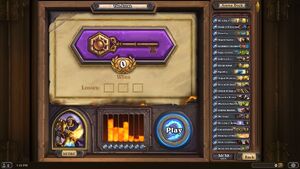
Commencing an Arena run
Play in Arena consists of a series of battles between Arena players, with each player using their specially constructed deck. Matchmaking for each pairing is determined by the player's win/loss record for the current run, attempting to find a player with as similar a record as possible.[1]
During each Arena run the player can suffer up to three losses, with the number of losses so far displayed on the Arena screen. Once a player has lost 3 times, or won 12 times, their run will end, and rewards befitting their success (or lack thereof) will be offered. Once the run has ended, the player's deck will be destroyed, and cannot be viewed or played with again.
Players can also choose to retire their deck at any time and claim their reward. However, it should be noted that completing all of a deck's Arena matches cannot reduce the reward on offer, only improve it. Retiring a deck should therefore be a last resort used only when unwilling to play with the deck any longer.
It should also be noted that if either player is disconnected from the server during a match and fails to return through the reconnection feature, that match is counted as a loss for the disconnector.
Claiming rewards

The 13 possible Keys
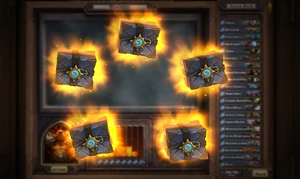
Opening rewards
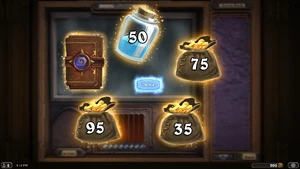
Claiming rewards
Once the player has won 12 games in total, lost 3 games, or retired their deck, they will be given a Key to open up the chest for their reward. Much like when opening a card pack, the player will be presented with a number of individual rewards, and must click on each in turn to discover their contents.
A range of rewards are possible, with both the number of individual rewards granted and their possible contents determined by the number of games the player has won. Rewards may consist of card packs, gold, Arcane Dust (used for crafting) and individual expert cards, including golden cards.
Reward structure
Each Key will grant the player a number of rewards, but the contents of each reward is determined randomly according to a range of possible values for that Key. Higher-level Keys grant a larger number of rewards, with more valuable contents. Higher-level Keys also have a range of possible values for the total number of rewards granted.
Certain rewards are guaranteed for each Key. The remaining rewards are determined randomly from a number of possibilities. The type of each reward appears to be chosen individually from the range of possibilities, with the result that each possible reward may be granted multiple times by the same Key. For example, a Key may reward several individual portions of arcane dust, several individual expert cards, or a mix of the possible reward types.
All gold and dust rewards have a range of possible values. Individual expert card rewards may be common, rare, epic, legendary and/or golden, and are not limited by class. Higher rarities/golden versions of individual cards appear to be far more common at higher levels, but according to some reports can occasionally occur at lower levels. The top three Keys may reward any rarity of card, but will not reward non-golden common cards.
All Keys grants the player one card pack. Keys at higher levels also offer a guaranteed gold reward, of a larger amount than other possible gold rewards for that Key.
Notes
Players will always be awarded one card pack regardless of the amount of games they have won, and even losing 0-3 will also grant a small amount of gold/dust. Since card packs can be purchased directly from the shop for 100 gold, this essentially makes the additional cost of an Arena run 50 gold, minus however much additional gold or dust is rewarded. If the player can earn more than this amount back in additional rewards, the run can be considered to have been profitable. Gaining experience in playing Arena can of course also be considered a worthwhile reward.
Winning at least 7 games will earn the player their entry fee back in gold, in addition to other rewards. Winning 3 to 5 games compensates for the difference between buying a pack directly and earning one through Arena.
The presence of different rewards can affect the size/quality of the other rewards selected for that player. For example, being awarded a common expert card will increase the value of the other rewards granted by that Key.[2] This may be due to the likelihood of the player already owning or simply having no desire for any given common card, making it likely they will simply disenchant it, for a mere 5 Arcane Dust.
Rewards are based solely upon the number of wins for the current run, and are not affected by performance in previous runs.[3]
Table
The below table aims to chart the range of possible rewards for each key. The 'No.' column lists the number of individual rewards granted by each Key.
The table is a work in progress, and does not yet chart the entire range of possible rewards. Specifically, the possible ranges of dust and gold rewards are presumed to be slightly larger than those stated, and individual cards are likely available at slightly lower levels than currently listed. Additionally, it is possible for higher rarity cards to be obtained at far lower levels than listed here, but the probability of this appears to be extremely low.
This table represents a collective effort to chart the range of possible arena rewards. Please contribute to the table by adding your own arena rewards! When adding data, please note individual rewards, eg. 235 + 85 + 20 gold, rather than simply 340 gold.
| Wins | Key | No. | Rewards | Random reward pool |
|---|---|---|---|---|
| 0 | Novice | 2 |
|
|
| 1 | Apprentice | 2 |
|
|
| 2 | Journeyman | 2 |
|
|
| 3 | Copper | 3 |
|
|
| 4 | Silver | 3 |
|
|
| 5 | Gold | 3 |
|
|
| 6 | Platinum | 3-4 |
|
|
| 7 | Diamond | 3-4 |
|
|
| 8 | Champion | 3-4 |
|
|
| 9 | Ruby | 3-4 |
|
|
| 10 | Frostborn | 3-4 |
|
|
| 11 | Molten | 3-4 |
|
|
| 12 | Lightforge | 5 |
|
|
Strategy
The strategy in arena is considerably different than in constructed play. The emphasis in "draft" mode is to know the powerful basic cards and which classes have the best class-specific cards. Constructed, on the other hand is much more reliant on the player's card pool and synergies between the cards they choose to play. Players may wish to make sure they have a good grounding in the game and the capabilities of each class before entering the Arena, as the admission charge can make Arena play costly for unsuccessful players.
There are two key differences between Arena and constructed play. Firstly, the deck is not limited to 2 of each card. This can allow players to build outlandish and otherwise impossible decks, such as a mage with 7 x Frost Nova, a priest with 5 x
Northshire Cleric, or a warlock with 2 x
Malygos. In regular play players can use this limit to anticipate their opponent's possible cards; for example, it can generally be trusted in regular play that a priest who has already played 2 x
Mind Control has no more Mind Control cards in their deck. Arena offers no such certainty; a player may lack many key basic cards, or may feature several of the same card. This affects Arena play because players are far less able to anticipate the deck construction and play of their opponent.
Secondly, players must select their cards in a fairly random process. This typically results in relatively random and unpredictable decks, and has two consequences: firstly, players cannot necessarily use their opponent's known cards to deduce the style of the rest of their deck, as is possible in constructed play; and secondly, there is a strong advantage when constructing a deck to attempt to build a strategy that is versatile, easily formed from multiple possible cards, and can function well in spite of key cards being missing from the deck. Class-specific cards are also generally selected less commonly in Arena card sets than in constructed play, making strong synergy decks less likely to find success in Arena.
Statistics
Arena competition presents a very specific pattern of player elimination. As each player must either win or lose each game to proceed to the next match, it is possible to calculate the specific percentiles and distribution across the possible win/loss records. This allows players to mathematically rank their run in the Arena according to the percentage of players who have achieved the same record.
Note that these statistics do not represent the player's actual chances of reaching any number of wins. Success in Arena is substantially determined by deck construction and skill in playing each match. The numbers below merely reflect the proportion of players who reach each number of wins.
Number of wins
Players may complete their Arena runs with between 0 and 12 wins, with the number of wins directly determining the scale of the prizes awarded.
The below table lists the percentage of players who reach each number of wins. For example, players achieving 5 wins are in the top 22.66% of players. 50% of players will achieve 3 wins or higher.
| Wins | Percentage |
|---|---|
| 1 | 87.50% |
| 2 | 68.75% |
| 3 | 50.00% |
| 4 | 34.38% |
| 5 | 22.66% |
| 6 | 14.45% |
| 7 | 8.98% |
| 8 | 5.47% |
| 9 | 3.27% |
| 10 | 1.93% |
| 11 | 1.12% |
| 12 | 0.65% |
Exact sequence of matches
Each Arena run features a potential of 14 matches for each player, with runs ended upon reaching 3 losses or 12 wins. In each match, it is possible to win or lose the game, dividing the players between one of two possible paths.
The below table shows the percent of players who will reach each given point on the overall potential sequence of matches, with numbers rounded off to two decimal places. The numbers in bold indicate possible final scores, assuming the player does not retire their deck. For example, we can see that only 0.02% of players achieve a 12-0 run, and that the most common score is either 1-3 or 2-3, with more than a third of all Arena runs ending with one of these scores.
| Lost | |||||
|---|---|---|---|---|---|
| Won | 0 | 1 | 2 | 3 | Cum. |
| 0 | 100% | 50% | 25% | 12.5% | 12.5% |
| 1 | 50% | 50% | 37.5% | 18.75% | 31.25% |
| 2 | 25% | 37.5% | 37.5% | 18.75% | 50.0% |
| 3 | 12.50% | 25% | 31.25% | 15.63% | 65.63% |
| 4 | 6.25% | 15.63% | 23.44% | 11.72% | 77.34% |
| 5 | 3.13% | 9.38% | 16.41% | 8.20% | 85.55% |
| 6 | 1.56% | 5.47% | 10.94% | 5.47% | 91.02% |
| 7 | 0.78% | 3.13% | 7.03% | 3.52% | 94.53% |
| 8 | 0.39% | 1.76% | 4.39% | 2.20% | 96.73% |
| 9 | 0.20% | 0.98% | 2.69% | 1.34% | 98.07% |
| 10 | 0.10% | 0.54% | 1.61% | 0.81% | 98.88% |
| 11 | 0.05% | 0.29% | 0.95% | 0.48% | 99.35% |
| 12 | 0.02% | 0.15% | 0.48% | - | 100.0% |
For those who are interested in the underlying mathematics, the below table shows the basic model using a theoretical count of 8192 players (2 to the power of 13), which is the smallest number of players capable of placing a whole number in each position.
Effectively, this table takes 8192 ball-bearings, and drops them through a maze which evenly divides them at each interval, thereby illustrating overall player distribution across matches. From this we can see that for every 8192 Arena players, only 2 will reach 12 wins with 0 losses, making this a 1 in 4096 achievement.
| Lost | ||||
|---|---|---|---|---|
| Won | 0 | 1 | 2 | 3 |
| 0 | 8192 | 4096 | 2048 | 1024 |
| 1 | 4096 | 4096 | 3072 | 1536 |
| 2 | 2048 | 3072 | 3072 | 1536 |
| 3 | 1024 | 2048 | 2560 | 1280 |
| 4 | 512 | 1280 | 1920 | 960 |
| 5 | 256 | 768 | 1344 | 672 |
| 6 | 128 | 448 | 896 | 448 |
| 7 | 64 | 256 | 576 | 288 |
| 8 | 32 | 144 | 360 | 180 |
| 9 | 16 | 80 | 220 | 110 |
| 10 | 8 | 44 | 132 | 66 |
| 11 | 4 | 24 | 78 | 39 |
| 12 | 2 | 12 | 39 | - |
Trivia
The symbols used for keys 4-10 are the same as the original Ranked play medals, in use for most of the game's closed beta. The first 3 keys are slight variations on the first 2 Ranked medals, although some of the keys have been given different names.
Gallery
 At the end of the run... |
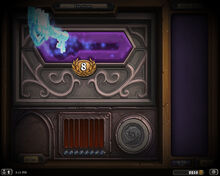 …the facade burns away... |
 …allowing the key to unlock... |
 …the Arena vault... |
 …releasing the player's rewards |
 Purchasing admission to the Arena |
Videos
Patch changes
 Patch 1.0.0.4944 (Open beta, 2014-03-11): Arena rewards at 10, 11, and 12 wins no longer reward common non-golden cards.
Patch 1.0.0.4944 (Open beta, 2014-03-11): Arena rewards at 10, 11, and 12 wins no longer reward common non-golden cards. Patch 1.0.0.4217 (Closed beta, 2013-12-10):
Patch 1.0.0.4217 (Closed beta, 2013-12-10):
- The number of matches you can win in Arena has increased to 12 (up from 9).
- Arena rewards have been restructured.
- Early alpha patches:
- 'The Forge' has been renamed 'Arena'.
- Players no longer keep the cards they select in the Arena.
References
- ↑ Zeriyah on Twitter. - "Arena matches you against someone with as close of a win/loss record as you have."
- ↑ Ben Brode on Twitter. (2014-05-22).
- ↑ Ben Brode on Twitter. (2014-06-29).
External links
- Guides
| |||||||||||
